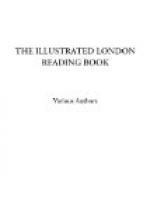With his passions, and in spite of his errors, Napoleon was, taking him all in all, the greatest warrior of modern times. He carried into battle a stoical courage, a profoundly calculated tenacity, a mind fertile in sudden inspirations, which, by unlooked-for resources, disconcerted the plans of his enemy. Let us beware of attributing a long series of success to the organic power of the masses which he set in motion. The most experienced eye could scarcely discover in them any thing but elements of disorder. Still less, let it be said, that he was a successful captain because he was a mighty Monarch. Of all his campaigns, the most memorable are the campaign of the Adige, where the general of yesterday, commanding an army by no means numerous, and at first badly appointed, placed himself at once above Turenne, and on a level with Frederick; and the campaign in France in 1814, when, reduced to a handful of harrassed troops, he combated a force of ten times their number. The last flashes of Imperial lightning still dazzled the eyes of our enemies; and it was a fine sight to see the bounds of the old lion, tracked, hunted down, beset—presenting a lively picture of the days of his youth, when his powers developed themselves in the fields of carnage.
Napoleon possessed, in an eminent degree, the faculties requisite for the profession of arms; temperate and robust; watching and sleeping at pleasure; appearing unawares where he was least expected: he did not disregard details, to which important results are sometimes attached. The hand which had just traced rules for the government of many millions of men, would frequently rectify an incorrect statement of the situation of a regiment, or write down whence two hundred conscripts were to be obtained, and from what magazine their shoes were to be taken. A patient, and an easy interlocutor, he was a home questioner, and he could listen—a rare talent in the grandees of the earth. He carried with him into battle a cool and impassable courage. Never was mind so deeply meditative, more fertile in rapid and sudden illuminations. On becoming Emperor he ceased not to be the soldier. If his activity decreased with the progress of age, that was owing to the decrease of his physical powers. In games of mingled calculation and hazard the greater the advantages which a man seeks to obtain the greater risks he must run. It is precisely this that renders the deceitful science of conquerors so calamitous to nations.
[Illustration: NAPOLEON.]
Napoleon, though naturally adventurous, was not deficient in consistency or method; and he wasted neither his soldiers nor his treasures where the authority of his name sufficed. What he could obtain by negotiations or by artifice, he required not by force of arms. The sword, although drawn from the scabbard, was not stained with blood unless it was impossible to attain the end in view by a manoeuvre. Always ready to fight, he chose habitually the occasion and the ground:




